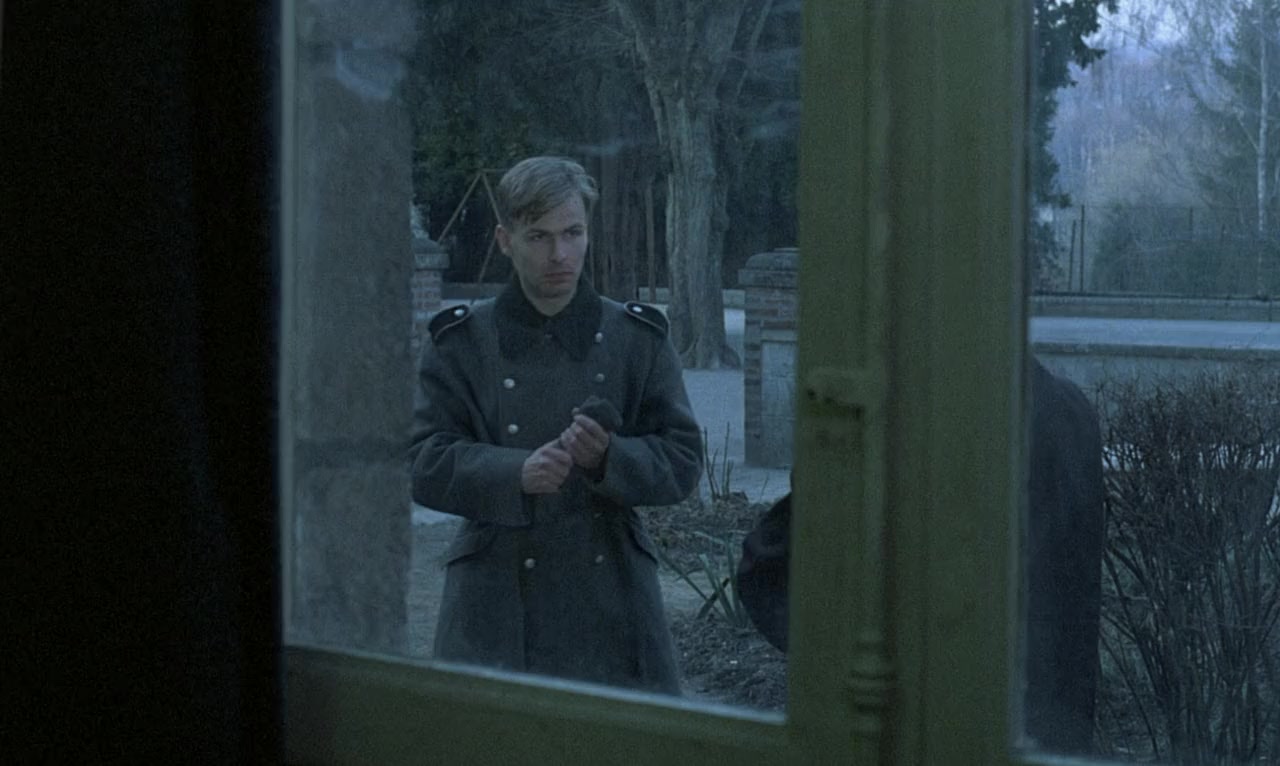
- Year: 1987
- Released: 12 Feb 1988
- Country: France, West Germany, Italy
- Adwords: Nominated for 2 Oscars. 28 wins & 13 nominations total
- IMDb: https://www.imdb.com/title/tt0092593/
- Rotten Tomatoes: https://www.rottentomatoes.com/m/au_revoir_les_enfants
- Available in: 720p, 1080p,
- Language: French, German, English, Greek, Latin
- MPA Rating: PG
- Genre: Drama, War
- Runtime: 104 min
- Writer: Louis Malle
- Director: Louis Malle
- Cast: Gaspard Manesse, Raphael Fejtö, Francine Racette
- Keywords: biography, parent child relationship, france, best friend, resistance,
 | 8.0/10 |
 | 88/100 |
 | 97% – Critics |
 | 93% – Audience |
Goodbye, Children Storyline
January, 1944 in Nazi-occupied France. From their Paris home, preteen Julien Quentin and his older, teenaged brother François Quentin have just returned to the all-boys boarding school at St. Jean de la Croix – a Carmelite convent – following the Christmas break. Outwardly, they are sent to boarding school because of the war, which is not to say that they may have been sent there regardless by their overbearing mother and absentee father, who they have not seen in two years as he works in Lille. Julien, generally looked up to by his classmates and respected by his teachers, likes to appear tough to his classmates, while in reality he is closer to being a scared little boy, a side of himself he is not afraid to show to his mother. A manifestation of the child side of himself is that he still occasionally wets his bed, something he hides in cleaning up before others awaken. The direct day-to-day issues of the war generally do not enter the school, and as such the boys are generally able to act like boys: they roughhouse (largely under the supervision of the teachers), and take advantage of getting care packages from home – which they are supposed to share in the Christian spirit – to trade with Joseph, an older boy who works in the kitchen, for things they really want, such as cigarettes. This term, three new boys enter the school, one, Jean Bonnet, who is the same age as Julien and as such is assigned to Julien’s class. Jean is Protestant and is therefore exempt from many of the Catholic rituals of the convent, such as communion. Beyond his name being easy to ridicule (“Easter bonnet”), Jean is treated as an outsider by his classmates due to his reserved nature. However, Julien slowly begins to see in Jean aspects of himself, that familiarity which eventually blossoms into a friendship between the two boys. That friendship is strengthened when Julien learns the secret reason behind Jean being at the school. This term will also show Julien what the Nazi persecution means to general French life, events at the school which will be part of him for the rest of his life.
Goodbye, Children Play trailer
Goodbye, Children Photos



Goodbye, Children Torrents Download
| 720p | bluray | 963.6 MB | magnet:?xt=urn:btih:984848B4755692814E9362664C52FC9915DE7A60 | |
| 1080p | bluray | 1.75 GB | magnet:?xt=urn:btih:B51B6A0E6C45EAB413200CF04A0BF8B5D679F226 |
Goodbye, Children Subtitles Download
| Brazilian Portuguese | subtitle Au.Revoir.les.Enfants.1987.720p.BluRay.x264. | |
| English | subtitle Au.Revoir.les.Enfants.1987.720p.BluRay.x264. | |
| Greek | subtitle Au.Revoir.les.Enfants.1987.720p.BluRay.x264. | |
| Greek | subtitle Au.Revoir.les.Enfants.1987.720p.BluRay.x264. |
Goodbye, Children Movie Reviews
excellent
There’s not a whole lot negative to say about the film. This is yet another excellent film about the holocaust. What I especially like about it is that it offers a view that is not typical of other films (i.e., the perspective of children in a boarding school). This unusual perspective lifts it about other holocaust films–nearly to the same level as the wonderful Shop On Main Street (from Czechoslovakia). It, too, had an unusual perspective.
The one thing, though that surprised me was that there were some sympathetic German soldiers in the film–such as the one who told the self-important French collaborator to leave the restaurant and leave the Jewish man alone as well as the apparently decent soldiers that brought the two lost boys home. Though surprising, it did add to the picture in that both good and bad Germans as well as good and bad Frenchmen are presented.
This film would be acceptable to watch by most anyone. Despite Malle having made many non-family friendly films, this one has very little objectionable material. For younger viewers, I would recommend watching the film with them, as it is sure to bring up a lot of confusion and emotional issues for younger viewers.
A powerful goodbye
Absolutely love foreign language films, whether French, German, Spanish, Italian or Russian etc and of all decades and genres. And what, admittedly not enough but enough to judge him a very talented director with some great films in his filmography, has been seen so far of Louis Malle has not been less than good or interesting, which is a much better standard for most directors in lesser efforts. Some films when directors were at their worst were real misfires.
1987’s ‘Au Revoir Les Enfants’, translated into English as “goodbye children”, is semi-autobiographical and is Malle’s most personal film, being very much a memoir. It also is a contender for his most emotionally powerful film and is among his very best. What’s more, ‘Au Revoir Les Enfants’ is a fantastic film on its own, one of the best and most emotional films seen in a long time. Its two Oscar nominations, for foreign language film and original screenplay, as well as many other awards (wins and nominations), were more than richly deserved.
Malle is a big reason as to why ‘Au Revoir Les Enfants’ makes as much impact in the way it does. There is so much passion and sensitivity in his directing, and he does it without sentimentalising or being gratuitously graphic in its depiction of friendships and cruelty. The film manages to be uncompromising and remarkably does not take sides, which was unexpected for a subject as difficult as this one (as difficult as one can get).
It’s beautifully filmed, without being over-glamorous and with the right amount of grit. On top of not being one-sided in its depiction of a brave subject, ‘Au Revoir Les Enfants’ is also one of the honest and poignant portrayals of friendship and youth, again because of the realism and not sentimentalising even though there are parts that are appropriately gentle. In a way that’s easy to relate to. There is some nice use of Schubert and Saint Saens too.
The script provokes a lot of thought. The ending is chills personified and really brought tears to my eyes. The portrayal of war and its impact on the characters is harrowing, although the pace is slow it never felt dull due to being so emotionally invested. The characters are very much rootable and well acted across the board, have not seen such beyond the years performances from younger cast members in a while.
Overall, fantastic. 10/10
compelling history but lacks tension
During WWII in Nazi occupied France, Julien Quentin is a momma’s boy unhappy to return to St. John of the Cross Carmelite Convent Catholic boarding school with his old brother François. A new boy Jean Bonnet arrives at the school. They eventually become best friends and then Jean tells Julien that he’s actually Jewish. Joseph works at the school and trades with the boys on the black market.
Filmmaker Louis Malle base this on his youth in a Roman Catholic school. This is compelling personal history of the larger story. However there is a lack of tension. It’s never in doubt that Bonnet was a Jewish boy in hiding. It may help if he was a blonde hair, blue eyed boy. There are a couple of incidences where Bonnet is in the vicinity of being discovered but the tension never build. There is a lot of boys being boys like a ‘Lord of the flies’ lite. It’s a bit annoying and directionless. I do like some scenes that don’t go straight like the restaurant where the German troops kick out the french police trying to take a Jew. The movie probably needs to give Joseph more time and set him up for the big turning point. The movie should probably concentrate mostly on Julien, Bonnet and Joseph and lose half of the rest.



